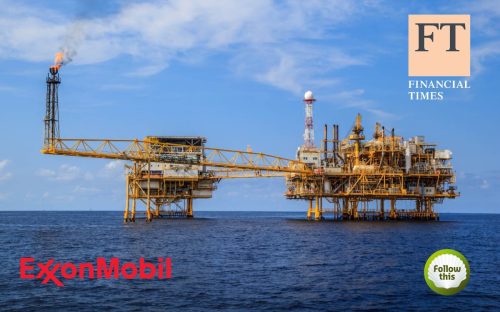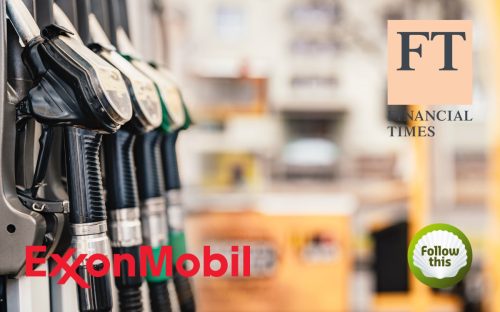Press release
Despite its new ambition, Shell couldn’t guarantee that its new climate ambition will lead to the necessary actions to achieve the Paris Climate Agreement, in response to questions from Follow This during its pre-AGM Q&A webinar today.
According to IPCC scenarios, to achieve the Paris Climate Agreement, by 2030, investments in renewables should fundamentally increase and absolute emissions should decrease, compared to 2019 levels. Shell couldn’t confirm these two requirements to achieve the Paris Climate Agreement. Ben van Beurden asked Mark van Baal from Follow This for “patience” regarding investments.
At the Shell AGM next Tuesday, May 19, the Follow This climate resolution, that supports the company to set Paris-aligned emissions targets, and invest accordingly, will come to a vote again.
“It is telling that Shell can’t guarantee shareholders that its new ambition leads to the investments and emissions reductions that are needed to actually achieve the Paris Climate Agreement,” says Mark van Baal, founder of Follow This. “The world needs immediate action and yet Shell asks for another round of discussions and patience.”
“We hope investors will take this lack of clarity into account when making up their mind about voting.”
“We understand that it’s not possible to give detailed financial forecasts, but in 2020 what we need to hear is that emissions will go down and investments in renewable energy will go up within this decade. Shell failed to reassure investors.”
+ + + +
SHORT TRANSCRIPT
Will your new ambition lead to a (net) absolute emissions reduction within this decade (by 2030)?
Ben van Beurden: “eventually, we will need to reduce our absolute emissions as well, quite significantly […] Which element we can achieve by 2030 will of course be very much a function of which part of the world we are talking about.”
Will your new ambition lead to a fundamental shift in investments away from fossil fuels to renewables of annually at least 50% of your investments by 2030?
Ben van Beurden: “I have to ask you for some patience. So the business that we have has been built over more than a century, we cannot change that overnight […] On the other side of this [Covid-19] crisis we will be coming with a good update.”
When the board rejects medium- and long-term targets in favour of maintaining the flexibility “to thrive in whatever world society moves towards” (Shell, 2018), does this include a scenario in which the world fails to meet the Paris goal to limit global warming to well below 2°C?
Neither denied nor confirmed.
FULL TRANSCRIPT
Will your new ambition lead to a (net) absolute emissions reduction within this decade (by 2030)?
Ben van Beurden: Your first question is on the intensity ambition versus an absolute emissions target. Of course, eventually, we will need to reduce our absolute emissions as well, quite significantly of course. But we will also have to invest in emission mitigation, such as carbon sinks, reforestation projects, carbon capture and storage, etc etc. These carbon sinks are absolutely essential to help deliver the required emission reduction in the timescale that is available to us to still meet the global climate ambition that we have. But they are only one of a number of tools that we will have to meet our ambition to become a net-zero energy business. Which element we can achieve by 2030 will of course be very much a function of which part of the world we are talking about. We hope that certain regions can really demonstrate that there is a successful path and that other regions will strive to follow in their wing. That’s why we are always supportive of, for instance, the EU or the UK making an ambition to be net-zero by 2050.
Will your new ambition lead to a fundamental shift in investments away from fossil fuels to renewables of annually at least 50% of your investments by 2030?
Ben van Beurden: Now your second question now on how much to invest and where to invest, I’m afraid I have to ask you for some patience. So the business that we have has been built over more than a century, we cannot change that overnight, but I can say a few things about the direction of travel. Last year, when we did our management day in June, we regrouped our businesses into 3 main clusters: we said we have our core upstream themes, we have our leading transition themes, and then we also said we have our emerging power themes. That allocation, that clustering is still very much relevant today. The leading transition teams, they are integrated gas, they are chemicals, they are the marketing business, they continue to be critical for us to capitalise on the energy transition to this lower carbon future. We’re building of course, also, an integrated power business that aims to capture the value from the growth in electricity consumption that will be part of this energy transition. And that focus on ‘let’s just invest more than just sustaining in the transition themes, and let’s really build a strong power business’, that focus hasn’t changed. And we will continue to grow these businesses, or we will continue to grow them disproportionately, compared to, for instance, our core upstream theme. Now, how exactly that will work out, we will have to give you a more detailed update of course, we are very much aware of that. But I hope you will also understand that giving detailed updates on exactly what we will be doing and how much money will go where and from where is kind of difficult in the environment we are facing today. So I will have to also there beg for your patience a little bit. On the other side of this [Covid-19] crisis we will be coming with a good update on how we see our strategy play out over the coming years.
When the board rejects medium- and long-term targets in favour of maintaining the flexibility “to thrive in whatever world society moves towards” (Shell, 2018), does this include a scenario in which the world fails to meet the Paris goal to limit global warming to well below 2°C?
Ben van Beurden: It’s important to recognise we can only sell the products that society needs. We cannot sell the products that people do not want or have no use for. That’s a very important constraint of course on how we can move forward. But two things also. First of all, I do think we will meet the climate ambition that was made in Paris. We may not quite be on track as a society, but I’m absolutely convinced that the will power of the world and the collective innovation we will have will get us there. And of course, we will have to do our part, and that is why we are working with the different sectors of the economy that use energy to figure out what their pathway is going to be to get to net zero. So just to hang back and say ‘well we will just supply the products that society needs, and then we will see where we end up’ is not our stance. Our stance is we will do our part to make sure that the main sectors of the economy do decarbonise – so in other words, become more efficient, use lower carbon energy, or somehow deal with the emissions that are still there – and we will be their partner up to the point that in the end, by 2050, there will be no emissions left on a net basis between ourselves and our customers.










